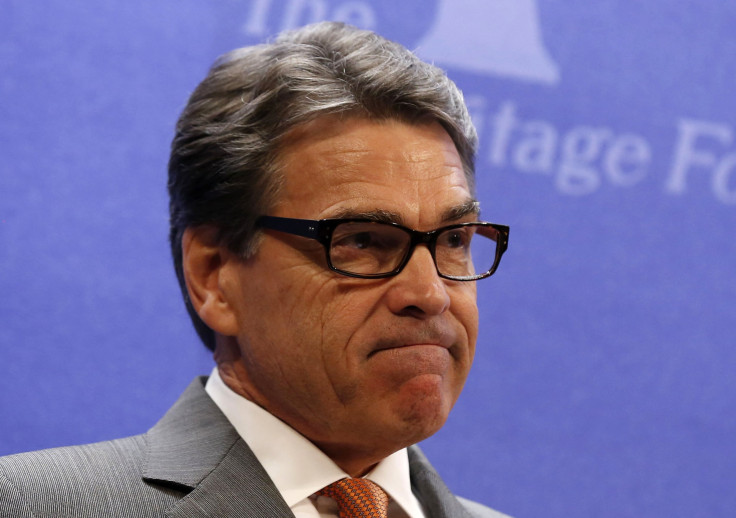Voting Rights Act 2015: Rick Perry Offended By Hillary Clinton's Texas Voter ID Law Criticism, Wants Minorities To Cast Ballots

Rick Perry said Friday he was offended by Democratic rival Hillary Clinton’s remarks about his state’s record on voting rights. The former Texas governor, who on Thursday announced his second bid for the Republican presidential nomination, said Clinton’s criticism of his and other Republicans’ support for voter ID laws was an attempt to revive claims that conservatives want to block most racial minorities from voting altogether.
The hosts of the cable news program “Fox & Friends” asked Perry if he thought the state’s court-blocked law requiring voters to show photo ID before voting was discriminatory. “No, not at all,” Perry replied, according to a Washington Times report. “I think it makes sense to have a photo ID to be able to vote. When I got on the airline to come up here yesterday, I had to show my photo ID.”
Clinton, who announced her second bid for the White House last month, on Thursday called out Perry by name on the issue during a speech at Texas Southern University. The Democratic front-runner also mentioned other declared and potential Republican candidates, Wisconsin Gov. Scott Walker, New Jersey Gov. Chris Christie and former Florida Gov. Jeb Bush, the supposed GOP front runner.
“Here in Texas, former Governor Rick Perry signed a law that a federal court said was actually written with the purpose of discriminating against minority voters,” Clinton said. “He applauded when the Voting Rights Act was gutted [by the Supreme Court] and said the law’s protections were outdated and unnecessary.”
Perry responded: “And actually, the people of the state of Texas is who she’s taking on, because that was a law that was passed by the people of the state of Texas.” He also denied that Texas officials don’t want minorities to vote.
Started the day off right with @foxandfriends. #Perry2016 pic.twitter.com/FfsbY4gXxT
— Rick Perry (@GovernorPerry) June 5, 2015
Clinton’s remarks on voting rights received some praise Thursday from civil rights activists. National Action Network president the Rev. Al Sharpton said the former U.S. secretary of state was right to call out state legislatures that are making it harder to Americans to cast ballots.
“We all know there’s an assault on voting rights in this country and I applaud Secretary Clinton for making access to the ballot box a central focus of her campaign,” Sharpton said in a statement. “Make no mistake, these issues aren’t ‘black’ or ‘white,’ but they are impacting lives across America, and this will be a pivotal issue in the upcoming campaign.”
Wade Henderson, who heads the Leadership Conference on Civil and Human Rights, said the Supreme Court’s 2013 decision in Shelby County v. Holder -- the ruling that invalidated a voting law preclearance provision for Southern states with a history of racial discrimination -- still required a response from Congress, as well as a president committed to protecting voting rights. “Those who oppose restoring the Voting Rights Act want us to believe that racial discrimination only exists in the history books,” Henderson said. “Unless Congress acts soon, voters will continue to face this discrimination at the polls as they attempt to participate in the first modern presidential election without protections of the Voting Rights Act."
© Copyright IBTimes 2025. All rights reserved.






















